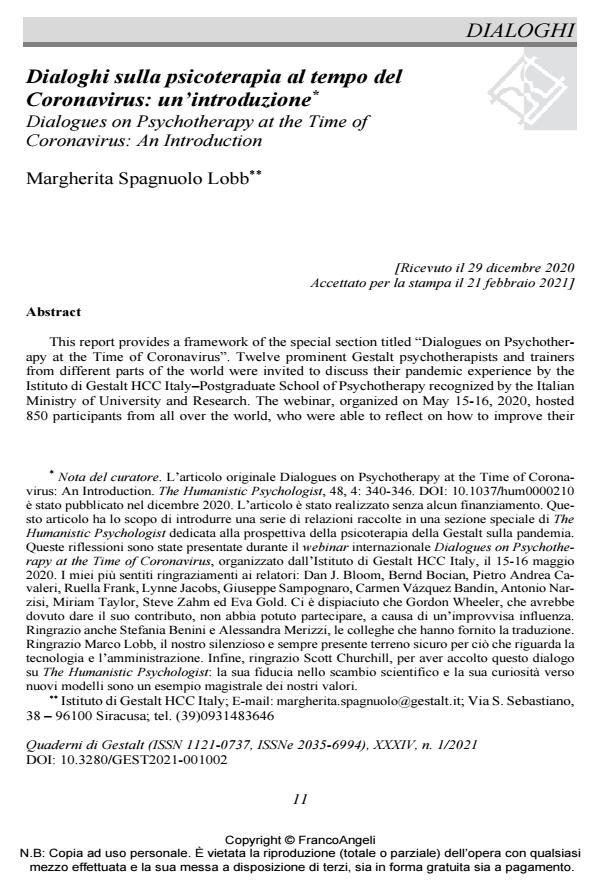Dialoghi sulla psicoterapia al tempo del Coronavirus: un’introduzione
Titolo Rivista QUADERNI DI GESTALT
Autori/Curatori Margherita Spagnuolo Lobb
Anno di pubblicazione 2021 Fascicolo 2021/1
Lingua Italiano Numero pagine 9 P. 11-19 Dimensione file 176 KB
DOI 10.3280/GEST2021-001002
Il DOI è il codice a barre della proprietà intellettuale: per saperne di più
clicca qui
Qui sotto puoi vedere in anteprima la prima pagina di questo articolo.
Se questo articolo ti interessa, lo puoi acquistare (e scaricare in formato pdf) seguendo le facili indicazioni per acquistare il download credit. Acquista Download Credits per scaricare questo Articolo in formato PDF

FrancoAngeli è membro della Publishers International Linking Association, Inc (PILA)associazione indipendente e non profit per facilitare (attraverso i servizi tecnologici implementati da CrossRef.org) l’accesso degli studiosi ai contenuti digitali nelle pubblicazioni professionali e scientifiche
Questo report fornisce un quadro della sezione speciale intitolata "Dialoghi sulla psicote-rapia al tempo del Coronaviru". Dodici eminenti psicoterapeuti e formatori della Gestalt pro-venienti da diverse parti del mondo sono stati invitati dall’Istituto di Gestalt HCC Italy - Scuo-la di Specializzazione in Psicoterapia riconosciuta dal Ministero dell’Università e della Ricerca - a condividere la loro esperienza della pandemia. Il webinar, organizzato il 15-16 maggio 2020, ha ospitato 850 partecipanti da tutto il mondo, che hanno potuto riflettere su come mi-gliorare le loro competenze come psicoterapeuti in questo momento di trauma globale, e tra-sformare questo evento epocale in un’opportunità di crescita. Dal loro dialogo sono emersi nuovi valori umanistici: uno spostamento dal sostenere lo sviluppo del potere personale al nuovo valore dell’essere-con e riconoscere l’altro. Questa discussione ha rivelato come la psi-coterapia della Gestalt, con la sua prospettiva sul sé come processo che ha luogo al confine di contatto con l’ambiente, e la sua anima relazionale che guarda alla co-creazione tra terapeuta e paziente, può contribuire significativamente a questa svolta. I relatori hanno riportato in questa sezione le loro riflessioni personali, cliniche e teoriche offerte durante il webinar. Il loro obiet-tivo può essere espresso con la domanda "Come possiamo raccontare ai nostri figli ciò che stiamo vivendo con un senso di bellezza e coraggio, in modo che possano andare avanti nella loro vita, contando su una base sicura e significativa?".
Parole chiave:Coronavirus, psicoterapia della Gestalt, Istituto di Gestalt HCC Italy, valori umanistici, psicoterapia e società.
Margherita Spagnuolo Lobb, Dialoghi sulla psicoterapia al tempo del Coronavirus: un’introduzione in "QUADERNI DI GESTALT" 1/2021, pp 11-19, DOI: 10.3280/GEST2021-001002